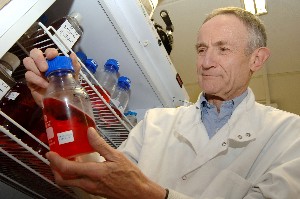New tool in battle against avian flu

A
As Nigel Dimmock at the
One drawback is that the coat of the flu virus is continually changing, so vaccination against one strain of flu, for instance H3N2, is totally ineffective against another, such as H5N1.
However, Prof Dimmock’s new approach developed over the last 20 years overcomes this by using an entirely new method, that uses a ‘protecting virus’. This virus contains genetic material that has been altered, rendering the virus harmless and unable to spread like a normal flu virus.
If it is joined in the cell by another influenza virus, it starts to reproduce at a much faster rate than the new influenza virus. This fast reproduction rate – spurred by the new flu infection – means that the new invading influenza is effectively crowded out by the ‘protecting virus’.
Prof Dimmock explains that this slows the progress of the new infection, prevents flu symptoms and gives the body time to develop an immune response to the harmful new invader.
“In effect the protecting virus converts the virulent virus into a harmless live vaccine.”
Trials show that this virus gives the samebeneficial effect for all strains.
“This is particularly valuable as a preventative measure as you don’t need to know the exact make up of the new strain before deploying the protecting virus
In addition it protects instantly, whereas protection generated by conventional flu vaccination takes 2-3 weeks to become fully effective.
He sees the ‘protecting virus’ having a useful role in poultry, as it is possible to deliver it in the bird’s drinking water. One dose should protect a chicken for weeks.
The
